Look Inside Seven Radically Different Bike Shops
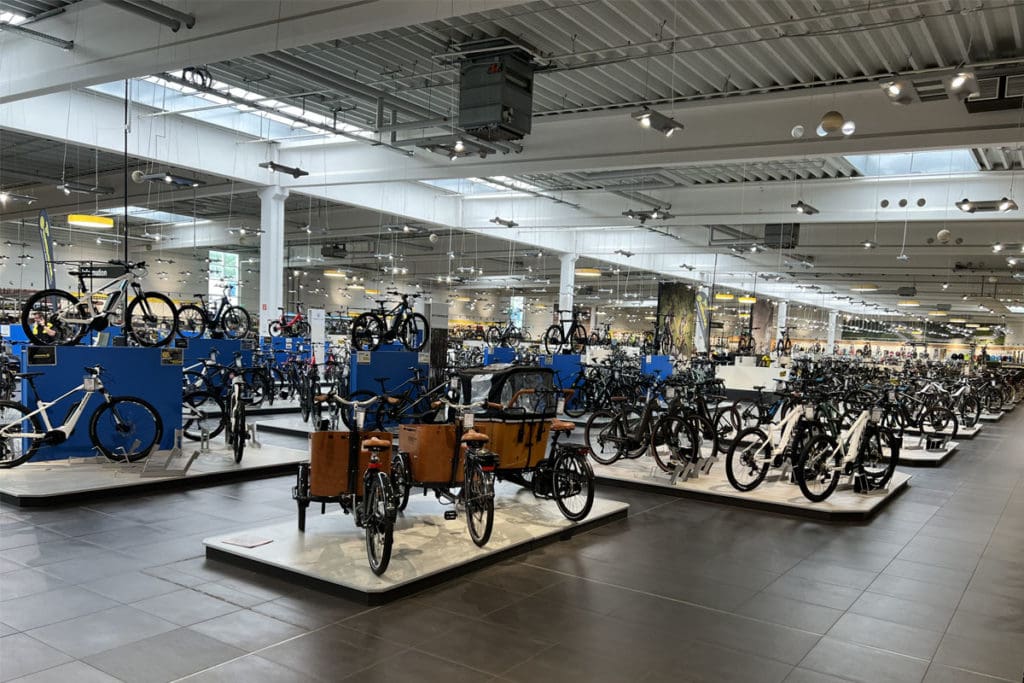
Frankfurt, Germany
It’s amazing how varied bike shops can be and still trade successfully. Arriving in Frankfurt with a day to spare before Eurobike-related activities, gave me the opportunity to visit seven radically different bike shops spread throughout the city and suburbs.
My three modes of transport between the shops were metro, trams and shared electric scooters. All but one of the stores were in city or inner suburban locations, perhaps within a three kilometre radius of the city centre. Only one was in an area more similar to Australian outer suburbia, with a large carpark outside the store.
Bike Boutique
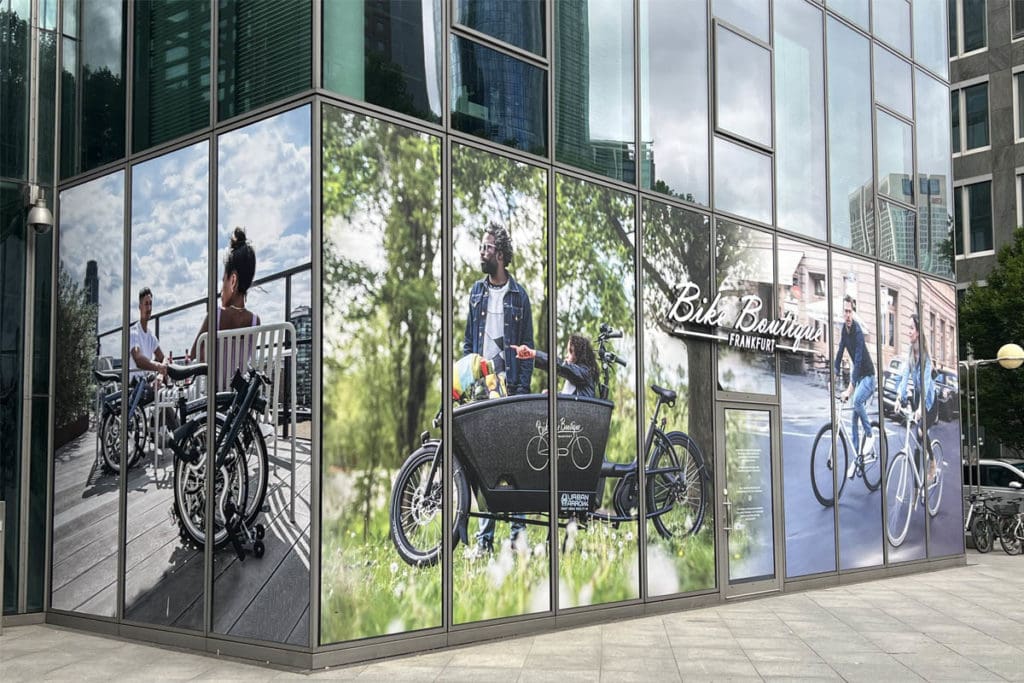
Strictly speaking I should have headed this article ‘Six’ rather than ‘Seven’ because unfortunately the first shop I visited, Bike Boutique, was closed on Mondays and I didn’t get the opportunity to return during trading hours.
This shop was in a prominent location on a main boulevard right in the heart of the modern financial district of Frankfurt, which is the main banking and financial city of Germany. Presumably its rent would be expensive! Frustratingly, every window was covered by photo murals so it wasn’t even possible to peek inside, but from the murals and their website, this appears to be a specialist commuting / recreation store.
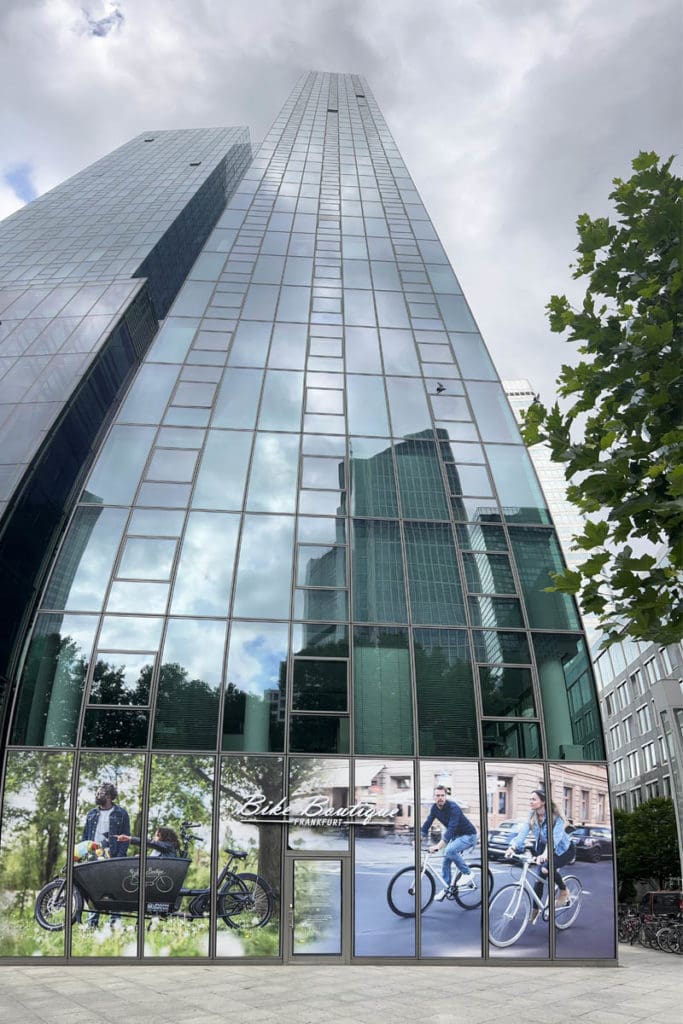
VanMoof
Next, I headed back to a busy location just north of the city centre where Frankfurt’s first and only VanMoof Service Centre was doing a brisk trade. The store consisted of a small showroom in front of a large workshop.
VanMoof is not yet active in Australia but this new company with unconventional business ideas is aggressively expanding in Europe. In August 2021, Amsterdam-based VanMoof raised a staggering US$128 million (A$184 million), which was the largest of a series of fundraising rounds totalling US$182 million (A$262 million), excluding two initial crowd funding rounds in 2018 and 2019.
We’ve written about Van Moof several times, including here and here.
At the Service Hub, I spoke to two young employees, Niklas and Sara.
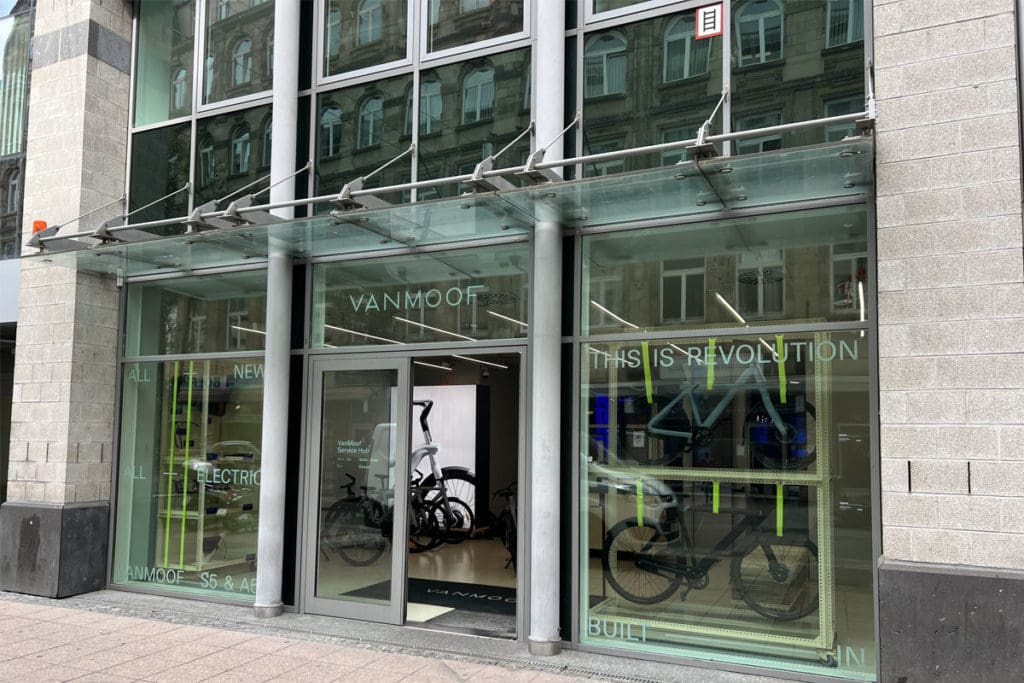
“We’re mostly here for servicing, also for providing test rides,” Sara explained. “We’ve been open a little over one year.”
“Most people own their bikes. Before we opened the shop you could only order them online.”
Some bikes are leased via employers in a national scheme called Jobrad that translates to ‘workbike’ and gives favourable tax advantages. The payments are deducted from the employee’s pay.
VanMoof’s range of bike models and colours is deliberately very small. Almost all the components on the bikes are non-branded, uniquely developed for VanMoof.
When I visited, they were just starting to transition from their 3 series models to 5 series.
“The ones we have right now are S3 and X3,” Sara continued. “We’re selling more of the 3s right now because these are the only ones you can test ride, so most people still want to buy the older ones. The A5 and S5 you can only see the pictures and buy online right now.
“They cost €$2,350 (A$3,454) for both of the 3 models. The new ones are €2,498 (A$3,672). If the customer orders online, the bike is shipped straight to their house in a large box that only requires fitting the front wheel, the pedals and straightening the handlebars.”
Sara continued: “Our workshop is one euro per minute (A$1.44) or €300 (A$432) for three years ‘insurance’. A typical ‘check-up’ costs €35 (A$50).”
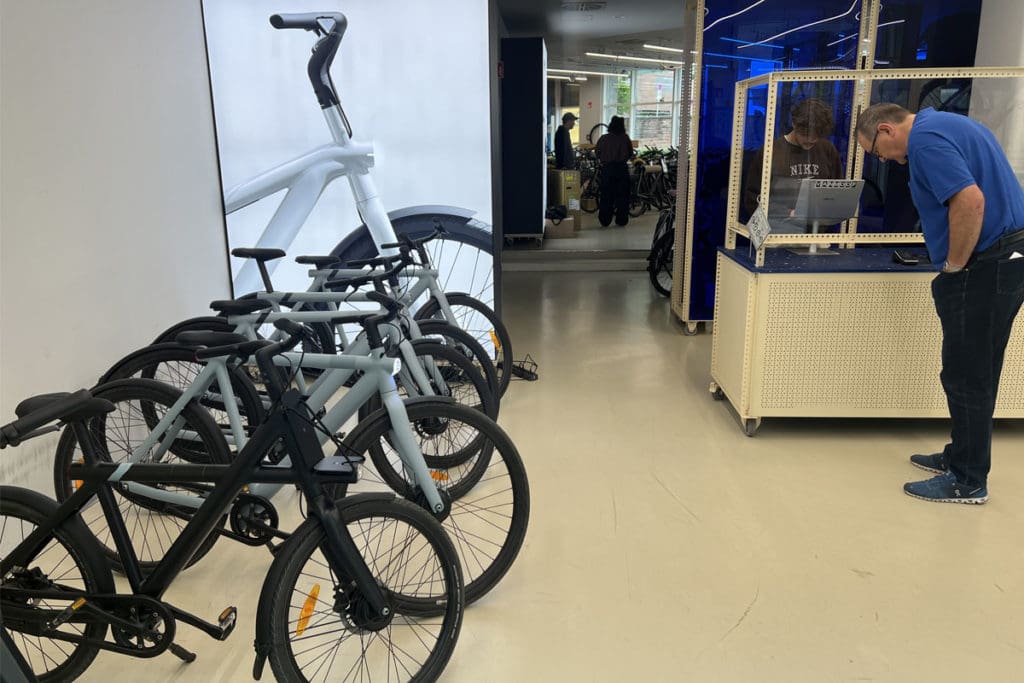
Customers could take their VanMoof to a regular bike shop but those shops are reluctant to touch them as most of the parts are exclusive to VanMoof and non-standard in terms of their size and fitting. There are now now seven service hubs like this across Germany, plus a further nine certified workshops.
“Before we had the service hubs here in Germany, customers would have to ship their bikes back to Amsterdam for repairs,” Sara said.
It seems that the new brick and mortar presence is working for this largely online brand. “We see a new VanMoof riding past the shop every day,” Niklas said. “A lot more people are coming into the store.”
Stadler
Leaving the city centre via about a 12-stop metro ride, I arrived at Stadler. In 33 years of bike media traveling and visiting shops across all of Australia and many other countries, I can say without hesitation that this was the largest bike shop I’ve ever seen.
It wasn’t like an Anaconda, Decathlon or other ‘big box’ stores you might find in Australia, that are of similar size but with only a fraction devoted to bikes. This was wall to wall 100% specialist bicycle store covering, by my estimation, 4,000 square metres.
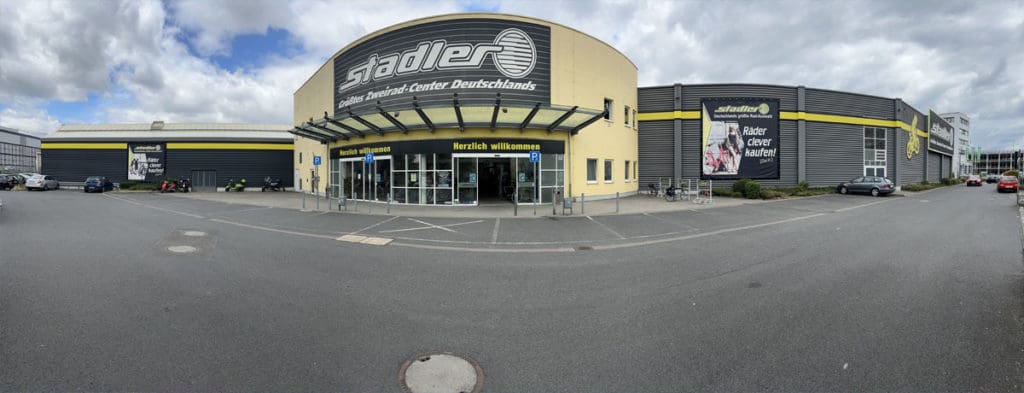
Stadler dates back to 1936 and is now owned by the third generation of the Stadler family. There are 21 stores in Germany, plus one in Austria, according to their website. The largest is 7,500 square metres.
I saw about 20 different brands across every bicycle category, including international dealer brands like Cannondale and Scott going right up to €5,000 (A$7,200) or more. Some bikes were on discount but not by large percentages.
The back wall and adjacent shelving covering about 20% of the floor area was dedicated to P&A. At the left-hand end was an open-plan workshop with 18 separate workstations, each equipped with a Park Tool electric bike hoist and its own bench and tool set. On the right-hand end, the apparel section probably covered about 600 square metres and carried every category and price point from budget through to high end brands like Assos.
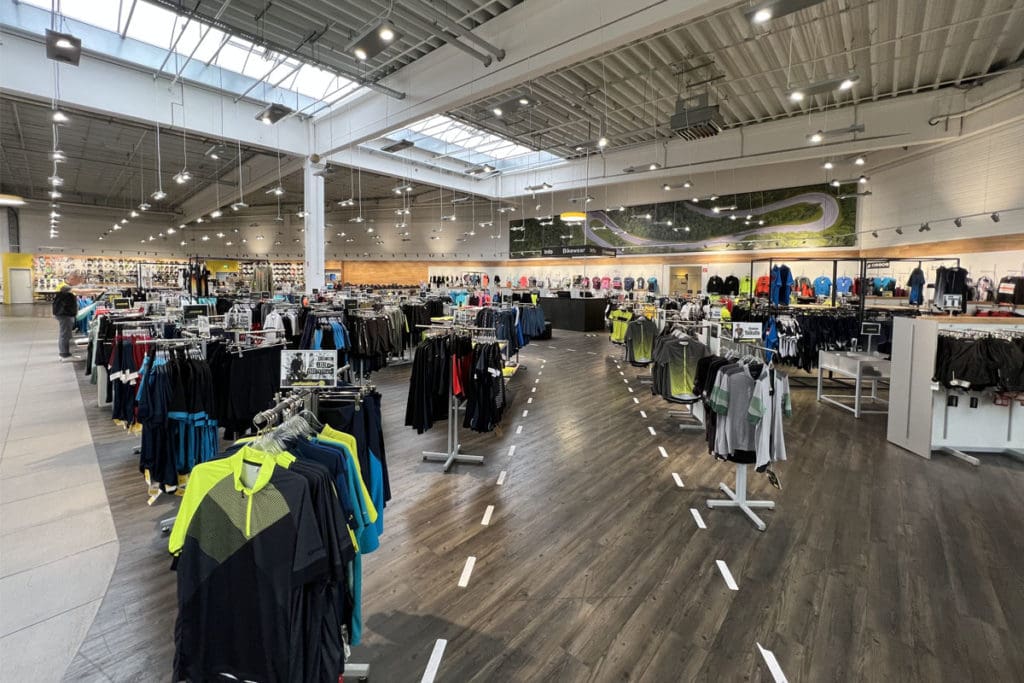
Only about a quarter of the bike floor space was devoted to e-bikes. There were a lot of lower-priced family and general-purpose bikes, but none down to a mass merchant level of price or quality.
During my visit there appeared to be a lot of staff on duty with not much to do; in fact, more staff than customers. According to one employee that I spoke to, they sold out of bikes during Covid, like every other bike shop and now they have plenty of stock, but business is quiet. He put it down to people are worried about the war in Ukraine and, in particular, uncertain gas future supplies from Russia upon which the German economy is heavily reliant.
Kettenesel
Next, I headed south of the Main River, to Kettenesel which translates to ‘Chain Donkey’.
The contrast between this store and Stadler could not have been more stark. Kettenesel was one fiftieth of the floorspace, in an old, charming tree-lined street of three to four-storey apartment buildings. What the store lacked in floorspace, it made up from in character.
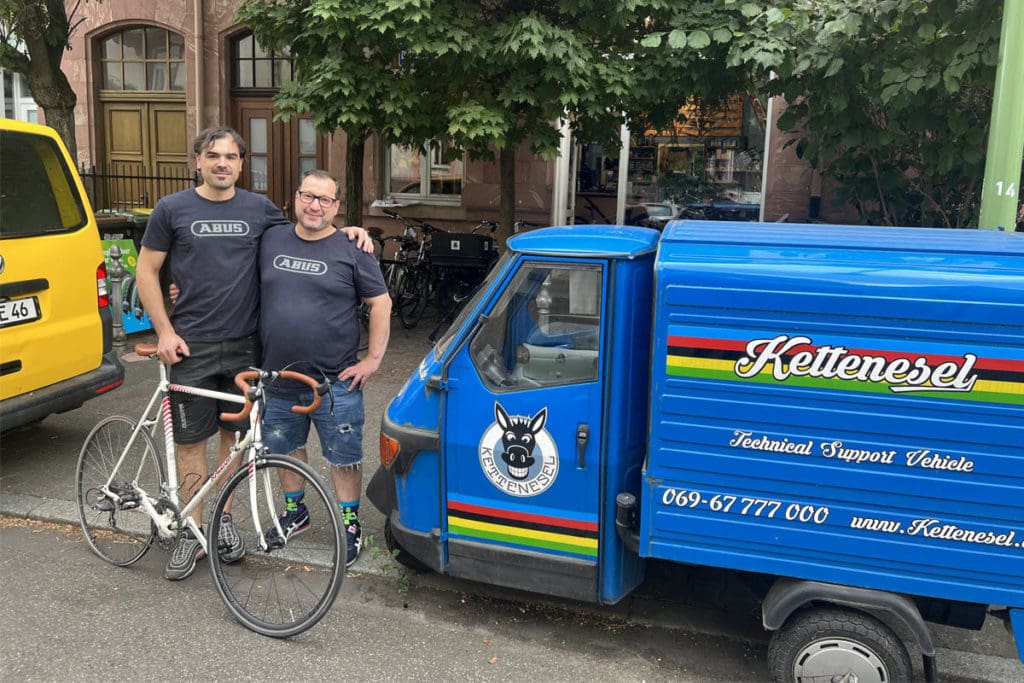
There I met founder Ismail Cakal, who prefers to be called Isi.
“I’m Turkish but I was born in Germany and lived my whole life here. My wife is German, my children speak German, not Turkish,” the jovial Isi explained.
“I was an industrial mechanic, then a technician for a machine building company. I worked for a big company but it wasn’t fun; 60 to 70 hours a week of work and I was close to a burn out.
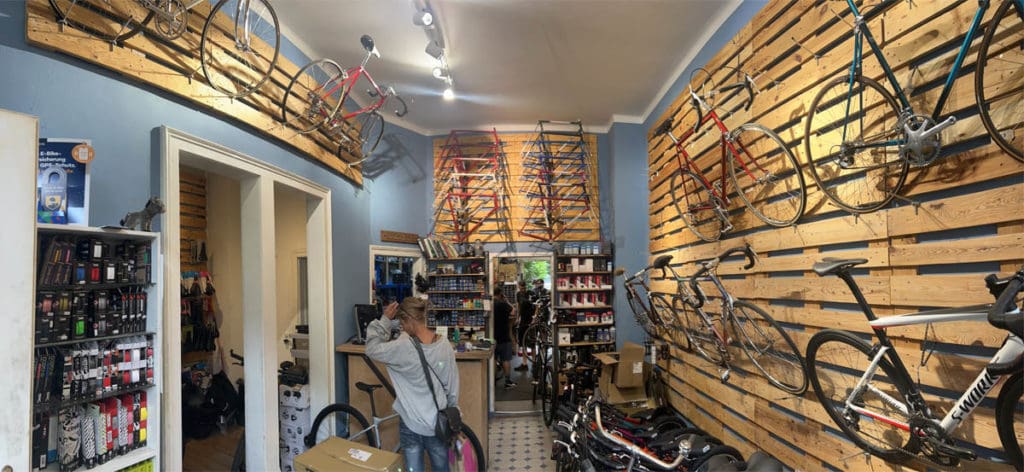
“I had the idea to have my own bike shop for 10 years or more. I opened the shop in April 2016. It’s quite young. I did all the fit-out myself.
“It was not easy to start because I didn’t have much money and I had to start small. But my customers were so nice and I’m so happy. I would do it again if I had to. As a small bike shop, I can make a good living. If it was bigger, I would do even better!”
The first thing an old roadie like myself noticed when walking into the store was a very nice collection of classic road bikes hanging upon the walls of the high-ceilinged store.
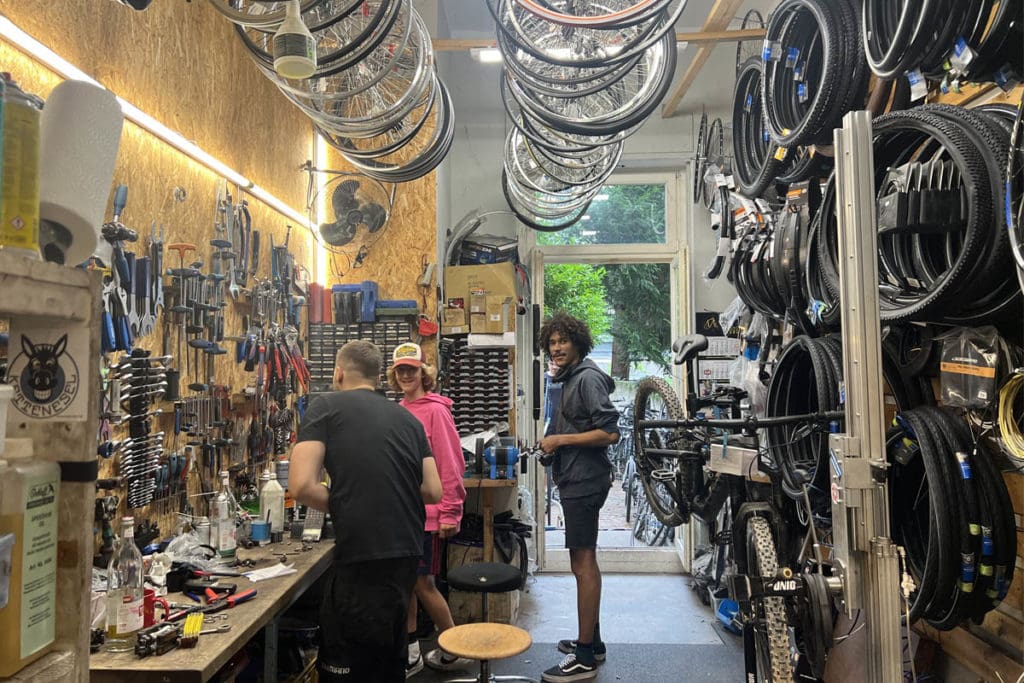
“I’m a collector of classic bikes,” Isi explained. “I have a few contacts around Europe in the Netherlands, Italy, Belgium and we trade classic bikes. But I sell Giant and Ku Bikes, which is a lightweight kids bike, built here in Germany.”
Through an open doorway I could see through to a busy, crowded workshop.
“I have three full-time mechanics plus helpers here and there,” Isi said. “That’s the charm of my shop. It’s small but you can find so much here. It’s only 80 square metres including the workshop. But soon I will get some more space that joins the back yard. As soon as it’s restored.
“Bike shops were allowed to stay open through Covid. It was hard to find bikes and parts. Last winter was one of my best winters. The weather was not so bad.
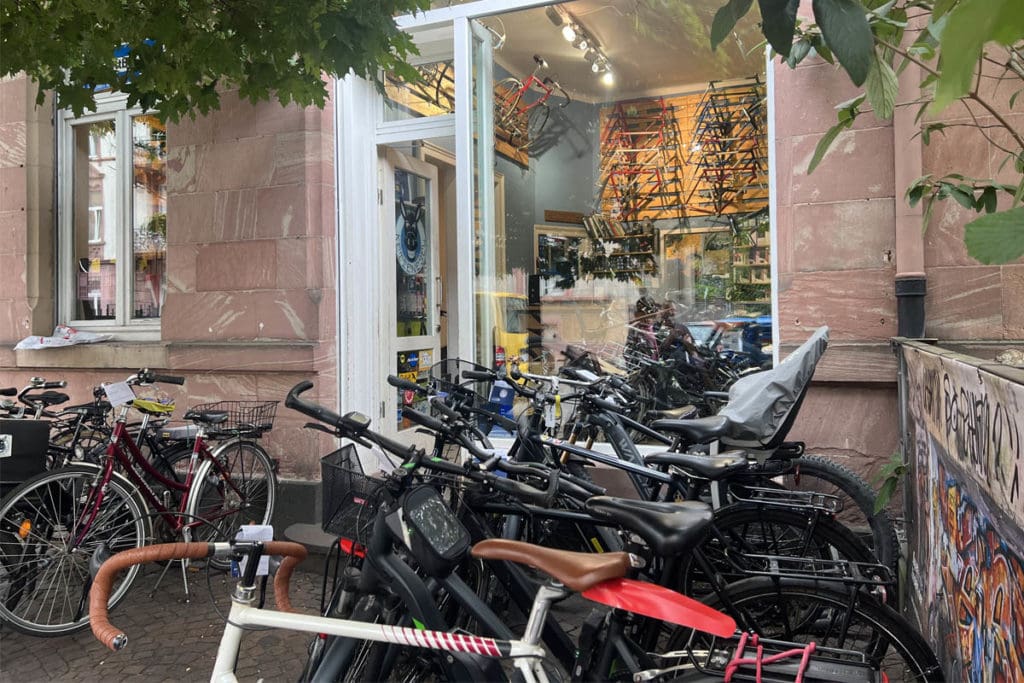
“It’s still busy now. Frankfurt has started to build more bicycle paths, which was nice for many people who are not so afraid to ride bikes compared to before. There’s a big difference compared to when I opened in 2016.
“I have nice guys, we have a young team. Everything’s fresh. We listen to music when we work and have fun. We eat together and I pay for the meal. Most mechanics don’t want to work for big shops. In Germany they say, ‘The bigger the fish, the more is stinks’.”
Zweirad Ganzert
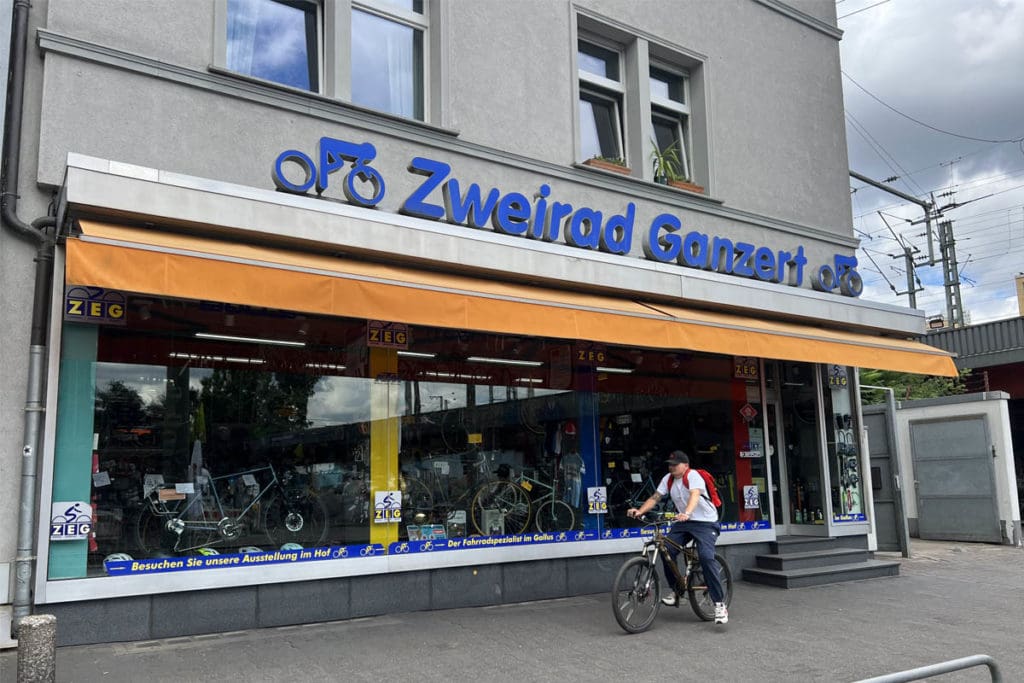
After a trip back across the river to a more industrial part of town, I arrived at Zweirad (‘Bicycle’) Ganzert. Located on a very busy road next to a railway bridge and tram line, Ganzert turns 100 years old next year.
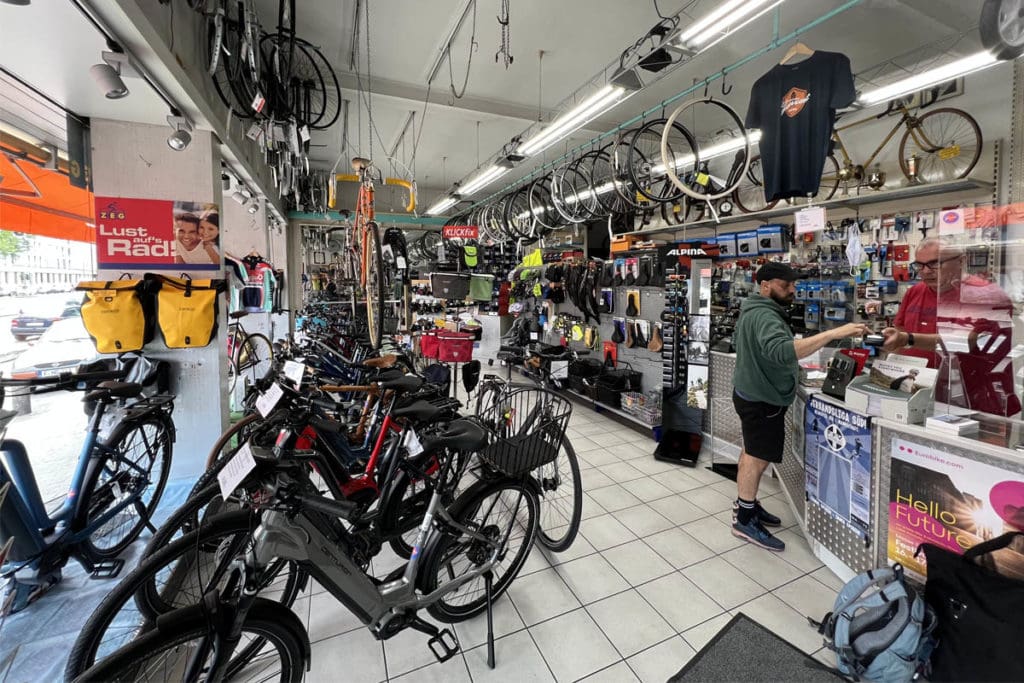
Alexander Burger, whose grandfather was the son-in-law of founder Wilhelm Ganzert, still works in the business which he said moved to its current premises in 1948.
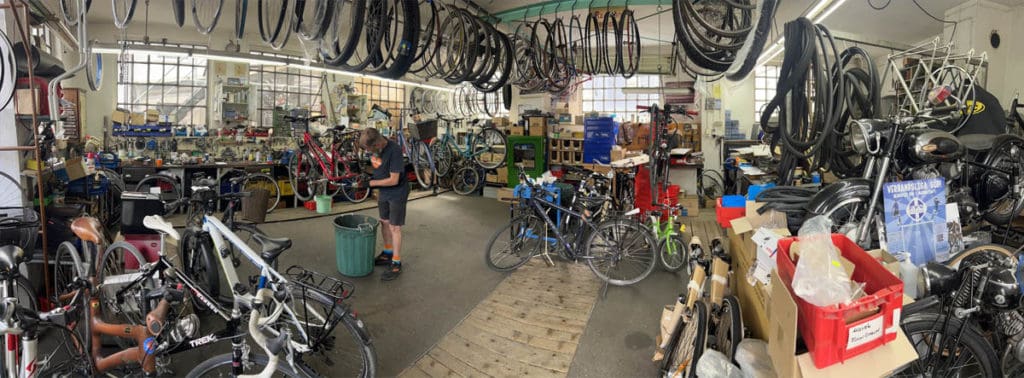
Upstairs over the separate workshop in the rear building is a vintage bike collection started by Mr Ganzert senior. Every year they go to Italy and ride their classic bikes at the original L’Eroica festival.
“The past two to three years we had plenty of repairs but we had more requests for bikes to sell than we could supply,” reported sales manager Florian.
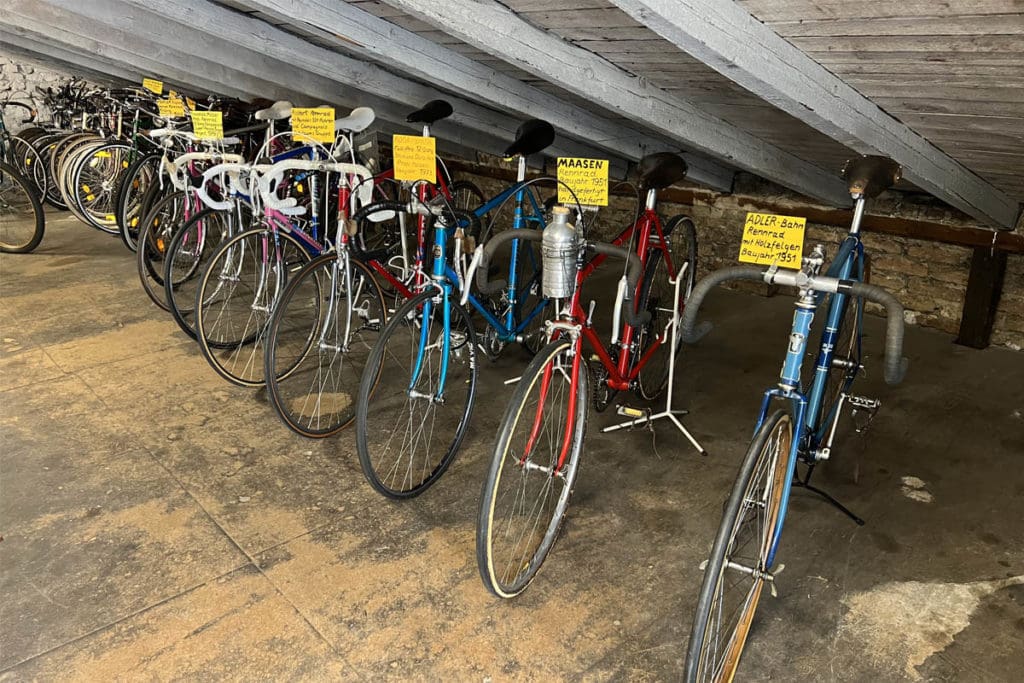
“It’s getting better but it will still be hard to get shipments for a while. Everybody here sells and repairs. We have four in the shop and the office, plus two mechanics.”
Flamme Rouge
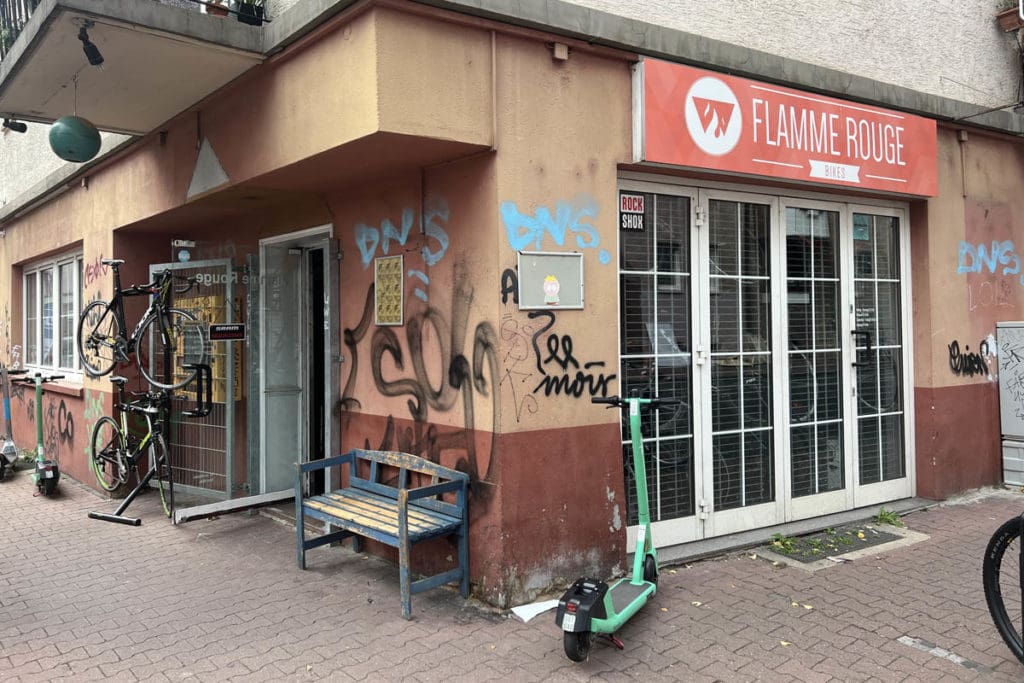
Also on the West side of town, but closer to city centre, was my next stop, Flamme Rouge.
As you can see from the photo, looking from the outside, this store looked small and rough, with graffiti covering the walls of a fairly uninspiring apartment building.
But one step through the door and you’re in ‘heaven for roadies’, with almost nothing other than high-end carbon fibre road bikes covering the floor and walls. They do diversify as far as gravel and triathlon bikes, but there’s not a utility bike or mountain bike of any variety to be seen.
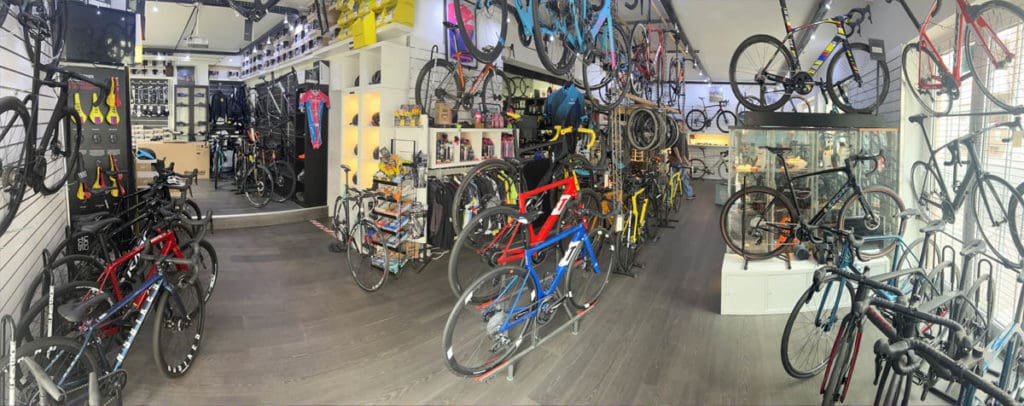
The store was opened in 2017 by business partners Jens and Marco. Everyone who works at the store also races. They said that supply held up well through the first part of Covid in 2020, but became short in 2021. Now business has slowed down and customers who would previously buy whatever they had are becoming more fussy, wanting the exact colour and size of their choice.
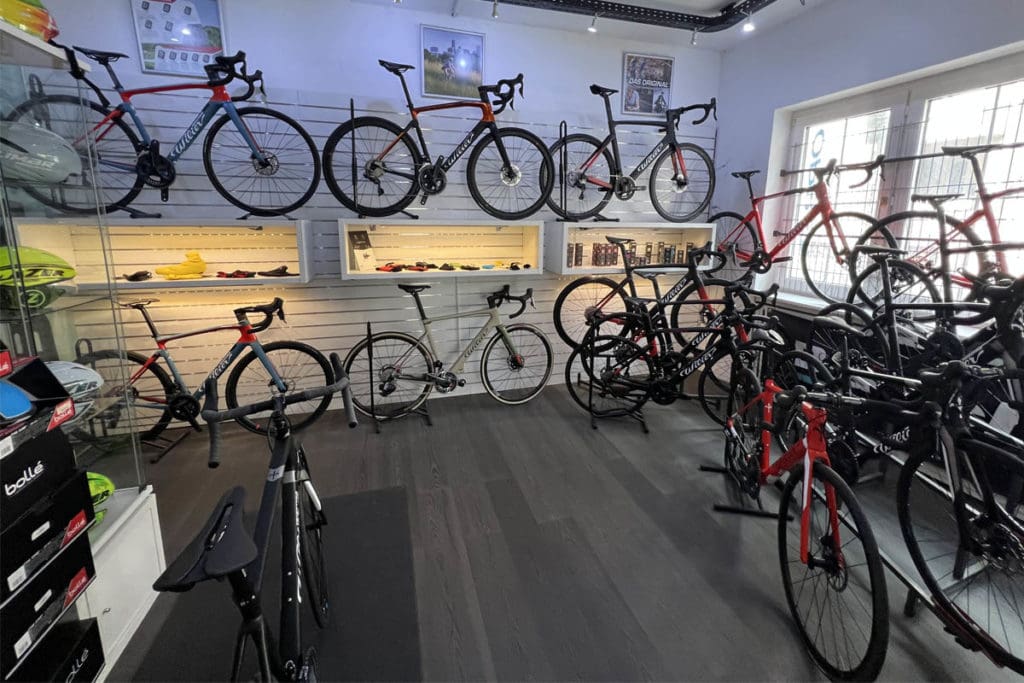
Their workshop, which charges €69 (A$100) per hour, is still busy, but the waiting list has reduced from four to two weeks. On every day but Monday they only take workshop work by appointment and it’s almost entirely high-end road bikes. On Mondays, they allow the local community to come in for small repairs on cheaper, non-road racing bikes.
Flamme Rouge is one of two pure road racing bike shops in Frankfurt.
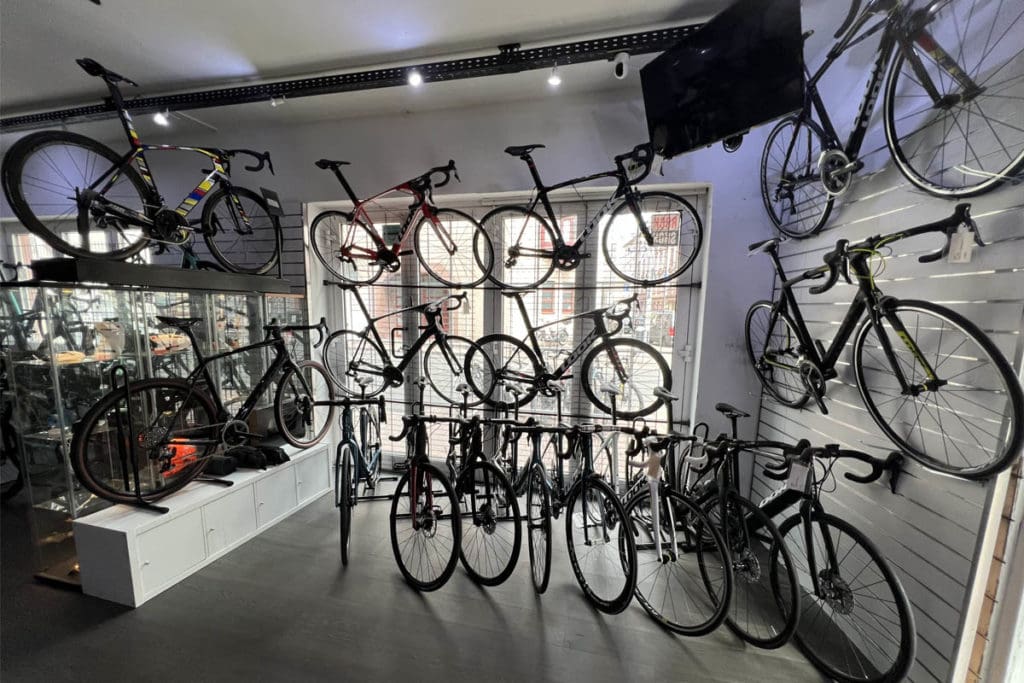
Parrots and Crows
My final store visit for the day was across on the west side of town. It would have taken well over an hour to walk, perhaps 40 minutes via public transport, 25 minutes in a taxi, but I took about 20 minutes via electric scooter, thanks to lots of ‘contra flow’ one-way streets and short cuts.
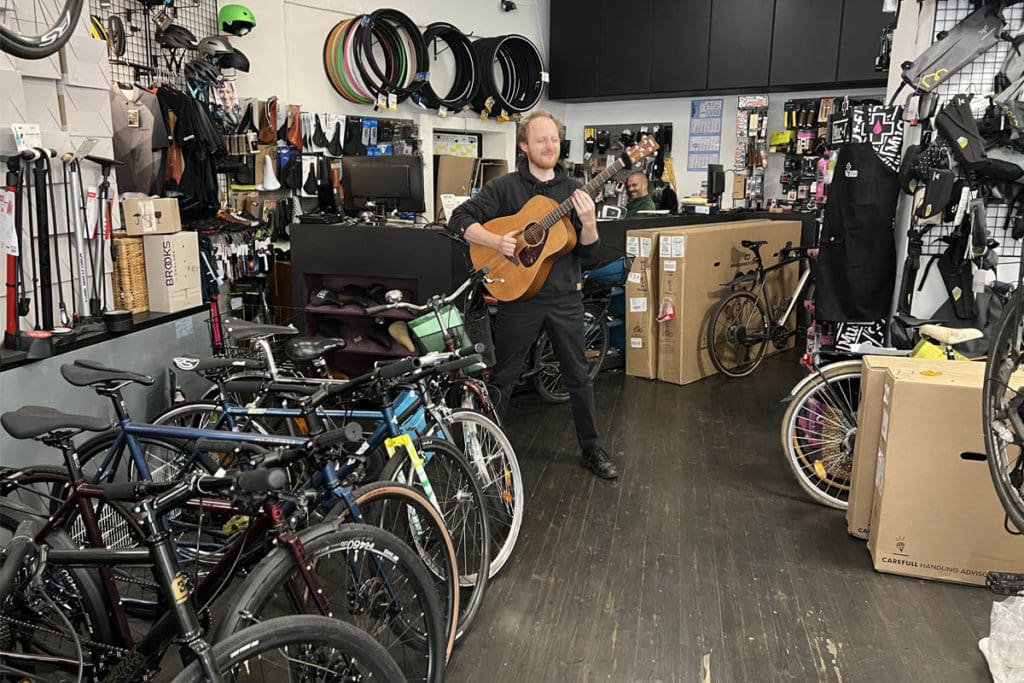
This was certainly a unique shop to end my day’s tour. Arno, who has worked at the shop for 12 years, was strumming away on an acoustic guitar. Arno said he always had his guitar on hand – and that he also plays bass.
The store owner, another Florian, used to be a bike messenger and was not happy with any of the existing stores catering to the ‘fixie’ bike messenger culture. So he started a small fixie shop in 2008 and moved to the current, much larger, location in about 2017.
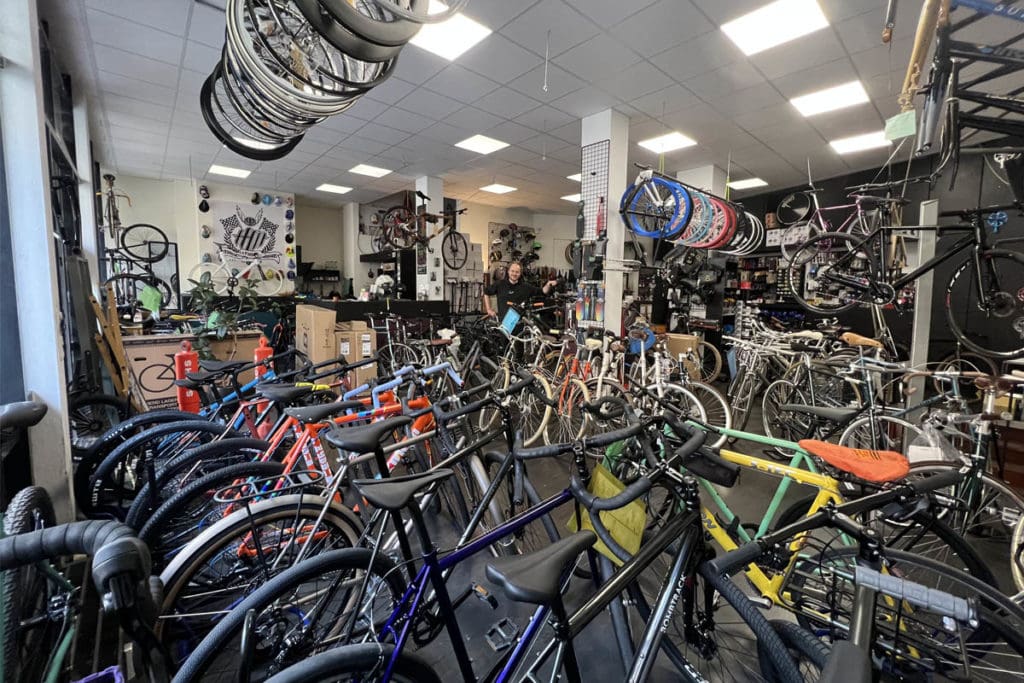
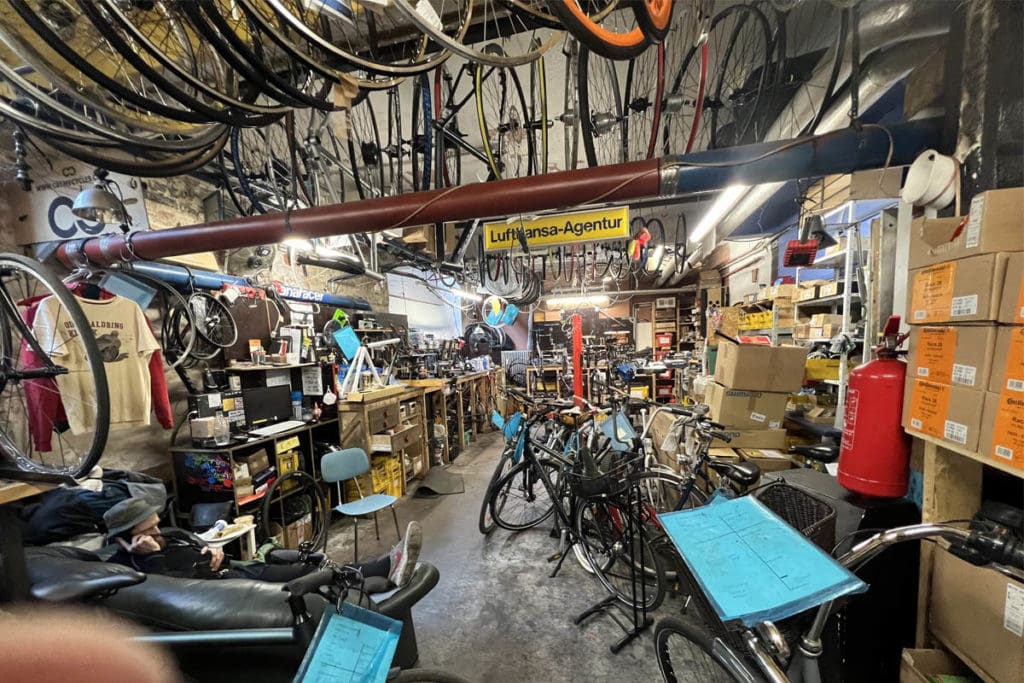
One thing this store did have in common with Flamme Rouge – neither sells e-bikes, despite the German-wide e-bike boom. Perhaps the odd e-cargo bike in the case of Parrots and Crows, along with some multi-geared urban bikes, but its core range is still fixies and other single speeds. The store has eight staff and had a three-week wait for workshop repairs, for which it charges €65 (A$94) per hour, which they said was the lowest rate in town.
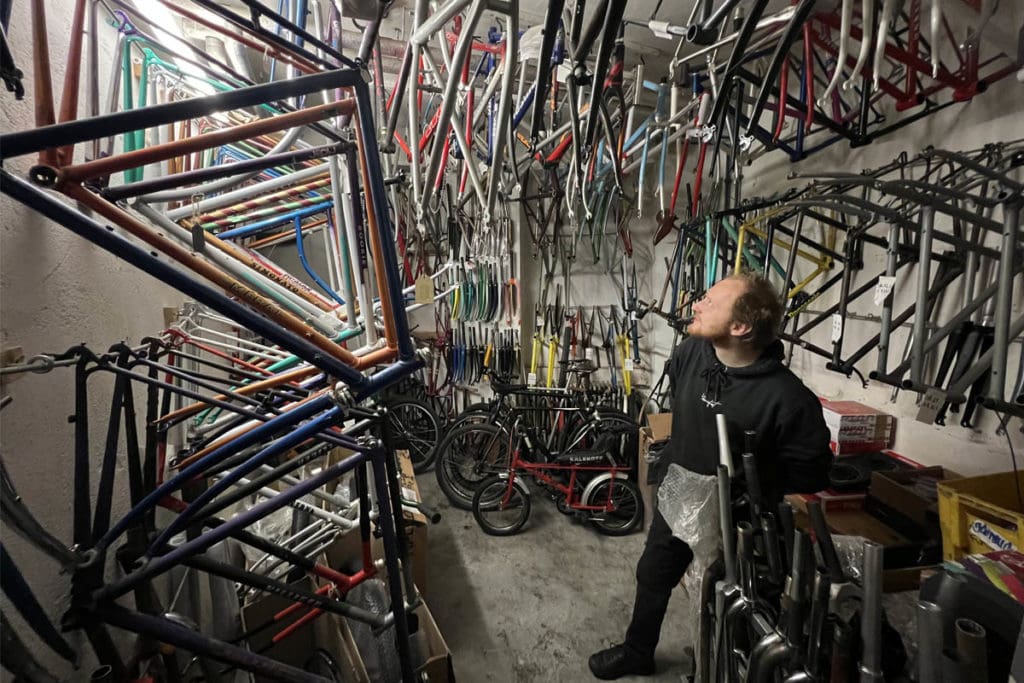
Of course, the question that had to be asked was the meaning behind the store’s unusual name. Apparently in German there’s a saying, ‘You bird!’ which means ‘You’re crazy!’. This, plus the owner liking birds, led to the name.

Great article! Have been to Frankfurt a number of times and had no idea it was so well serviced with bike shops.